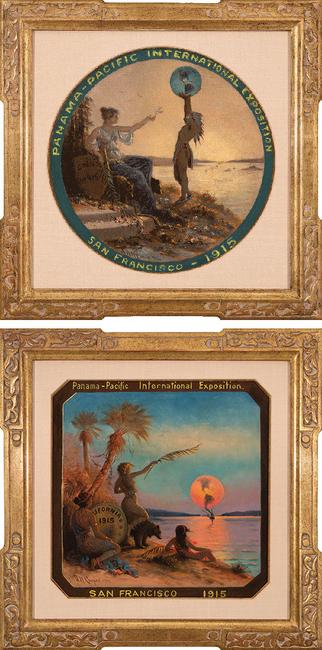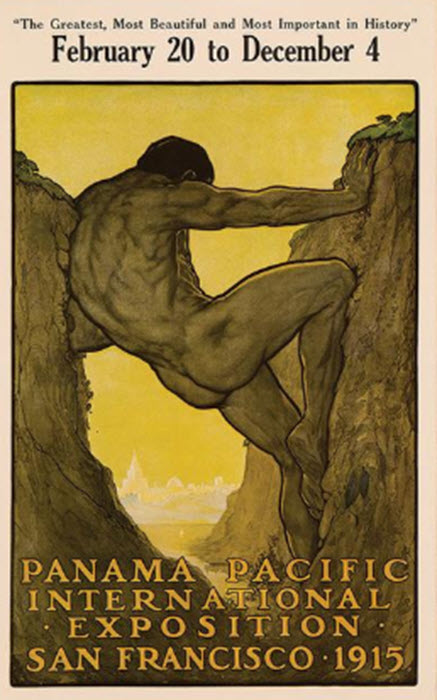Spencer Helfen Fine Arts is pleased to present an important historical exhibition: The Magical Panama-Pacific International Exposition of 1915, now online.
105 years ago a Magical City was constructed inside the City of San Francisco… that Magical City was the 1915 Panama-Pacific International Exposition (PPIE).
(i) the opening of the Panama Canal in August of 1914. The Canal assisted shipping by shaving 8,000 miles off the voyage from New York to San Francisco and eliminated the dangerous passage through the Straits of Magellan,
(ii) the 400th anniversary of Vasco Núñez de Balboa’s 1513 crossing of the Isthmus of Panama, thus being the first European to reach the Pacific Ocean, and
(iii) of great importance, San Francisco’s recovery from the devastating 1906 earthquake and fire.
With the passage of legislation by Congress, San Francisco was designated to host the 1915 world’s exposition, with President Taft himself breaking ground there on October 14, 1911. From that point the City of San Francisco and its artisans began designing all aspects of the Exposition.
A.D.M. Cooper painted allegorical scenes as possible seals for the Exposition. Perham Nahl’s Thirteenth Labor of Hercules was the image selected as the poster to advertise the Exposition as well as to serve on the cover of the daily programs. Other artists commemorated the fair with images of some of the awe-inspiring structures constructed for the Exposition, including Anna Althea Hills’s elegant rendering in oil of the Court of the Italian Building, Isabel Hunter’s depiction in pastel of the Court of Abundance and Francis Bruguière’s Tonalist photographs of the Palace of Fine Arts, itself designed by famed architect Bernard Maybeck.
Perham Wilhelm Nahl was born in San Francisco in 1869, the son of artist Hugo Wilhelm Arthur Nahl (1820-1889), who was a landscape and portrait painter. Perham Nahl first studied art with his father and his uncle, Charles Christian Nahl (1818-1878), who designed the grizzly bear in the California State flag. One of Nahl’s best-known works is the official poster for the PPIE. Nahl’s painting, The Thirteenth Labor of Hercules, depicts Hercules as a colossus ripping open the Culebra Cut to create the Panama Canal. Hercules was a Roman hero and God (the equivalent of the Greek hero Heracles), known for his many adventures. Certain of these adventures became known as the “Twelve Labors.” In Nahl’s image, Hercules is performing his thirteenth labor, the splitting open of rock to create the navigable canal. The waterway can be seen at the bottom of the image together with a gleaming “city” in the distance, possibly symbolizing the PPIE.
A.D.M. Cooper embodied the artistic spirit of the West – irrepressibly adventurous, while always deeply respectful of its landscape, native peoples and wildlife. Cooper was born in St. Louis, Missouri in 1856. Cooper moved to California when he was 24, establishing his first studio in San Francisco’s Latin Quarter (now known as North Beach). Three of Cooper’s paintings depicting Native American life were exhibited at the 1900 Paris Exposition. A prolific artist, in 1911 Cooper created at least two allegorical paintings intended as proposed seals for the PPIE. The first of these seals depicts a maiden symbolizing California flanked by two grizzly bears (designated in 1911 as the image on the State flag) and sitting adjacent to large Redwood trees that are endemic to Northern California. The flowers at her feet could be California Poppies which were designated as the State flower in 1903. A Native American stands before her holding the world above his head. The world is depicted with the Northern and Southern hemispheres in view with a separation denoting the Panama Canal. In the distance, ships can be seen traversing through the Canal and the Golden Gate. Cooper’s adroit use of allegory to depict California’s most meaningful symbols is compelling.

Cooper created the Proposed Seal of the 1915 Panama-Pacific International Exposition (Octagonal Image) in 1911. Once again, Cooper’s use of allegorical figures and symbols to tell the story of California and the Canal is masterful. In this painting three women, presumably Native American, welcome or perhaps are sending off travelers on their way toward the Panama Canal in the background. The women are depicted with a grizzly bear and a shield announcing the PPIE. Do the Palm trees symbolize California foliage or rather the tropical weather of Panama? The smoke from one of the ships gives shape to a world depicted as the setting sun where the northern and southern hemispheres are delineated. The deep hues of the sunshine give the impression of rebirth, perhaps of San Francisco itself.
Anna Althea Hills exhibited in the Panama-California Exposition in San Diego in 1915, winning a bronze medal, and also painted scenes of the 1915 Panama-Pacific International Exposition in San Francisco, which included her graceful and vibrant portrait in oil: Court of the Italian Building, San Francisco Exposition ?–? 1915. Isabel Hunter’s work was included in the PPIE, and she also painted and sketched scenes outside among the buildings of the Exposition with great clarity, as with her The Court of Abundance, Panama Pacific International Exposition, 1915, painted with pastel during the Exposition. Hunter’s PPIE pastels were exhibited at the San Francisco’s Rabjohn & Morcom galleries in 1915. Her attention to detail and skilled draftsmanship are evident in this artwork.
We are pleased to present these original paeans to the PPIE, a Magical City that existed from February 20 to December 4, 1915.
Stay Safe!!
